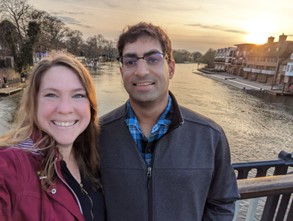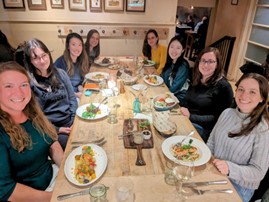A New Approach to Postdoc Work-Life Balance
Blavatnik Regional Awards Finalist Amy R. Strom, PhD, offers advice on the subtle differences postdocs must consider when finding work-life balance.
Published September 17, 2024
By Amy R. Strom, PhD, Postdoctoral Fellow, Princeton University
2024 Blavatnik Regional Awards Finalist in Life Sciences

Is work-life balance truly harder for postdocs than other professions? The short answer is yes, and there’s a reason you’ll find so many “How I Found Balance” articles written by academics. These narratives often focus on the number of hours spent at work versus at home, which is, of course, an essential aspect of balance. However, this narrow focus misses a crucial component: the role of the employer in shaping the work environment.
Achieving balance in the face of obstacles is not just about personal discipline; it often hinges on the resources and support provided by the institution. We should be building structures that empower individuals to create a balanced life.
My own journey in science has required a long-distance relationship during my postdoc, between New Jersey and California. I have had to carefully organize my project timelines and fund cross-country flights in order to spend time with my partner, but even with these personal sacrifices I quickly ran out of leave.
An Individualized Approach
Then I advocated for myself to my mentor and the University to be able to work remotely from out of state without the time away from campus being counted as vacation. As an experimentalist, remote work can be complicated to coordinate, so I am grateful to my partner, to my mentor and to the administrators in my department for their support in identifying a solution that works for my personal situation.
Perhaps establishing this solution and sharing the story will aid postdocs in similar situations in the future (long-distance relationships among academics are not rare), but more practically, it is important for each individual to get the support they need to enact their own personal solutions. I credit my own navigation of my challenges not in small part to coalescing with a group of fellow women grad students and postdocs who face different but equally complex challenges. Together we discuss the difficulties we face and help each other brainstorm potential solutions. Women in Science groups and other shared identity groups provide not only a sense of belonging but also a platform for advocacy.
Postdocs are not a monophyletic clade. We are women, men, nonbinary, single, partnered, married; we are sexually, racially, and culturally diverse. Such diversity means that a one-size-fits-all approach to work-life balance is ineffective at best and harmful at worst. This is where mutual and intersectional advocacy becomes crucial. By recognizing our shared challenges and working together, we can push for changes that benefit us all.

Postdocs and Unionization
In the summer of 2024, postdocs at my home institution, Princeton University, voted to become part of the United Auto Workers (UAW) union, an American union that has grown to represent more than just the auto industry. This victory required immense effort from many current postdocs, demonstrating the power of collective action.
Unionization will allow us to gather centralized information about our needs and bargain more effectively with the University for policy changes that will benefit us as a group and as individuals. Now just a few weeks later, a survey is collecting data on the most pressing issues we face, from pay equity to green card applications to family leave policies. I enthusiastically look forward to the additional support and benefits that Princeton will enact based on these data.
So, this National Postdoc Appreciation Week, let’s truly appreciate postdocs. Let’s listen to their unique stories, empathize with their individual challenges, and then make real, tangible, institutional changes to support them. Acknowledging the diversity of experiences among postdocs is the first step towards creating a more equitable academic environment where each individual can achieve their own balance.
About the Author and the Award
Amy R. Strom is a 2024 Blavatnik Regional Awards Finalist in Life Sciences
You can learn more about her and the Blavatnik Awards at Blavatnikawards.org
This piece published on the National Postdoctoral Association member blog is part of 2024 National Postdoc Appreciation Week. Current Academy Members can receive a 20% discount on a National Postdoctoral Association postdoc individual membership by emailing customerservice@nyas.org and requesting the NPA membership discount code
